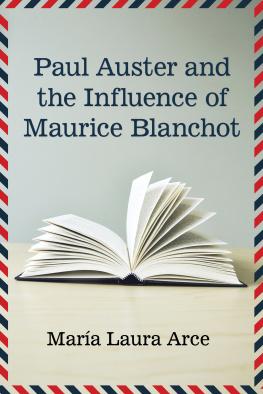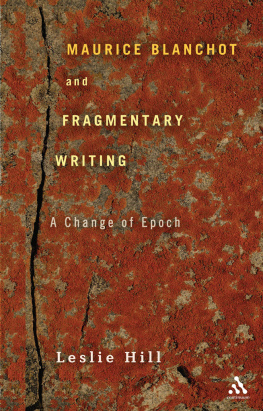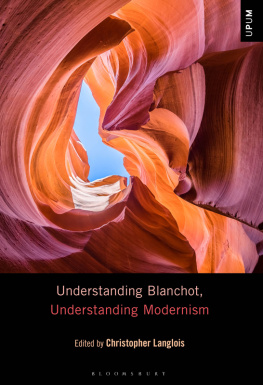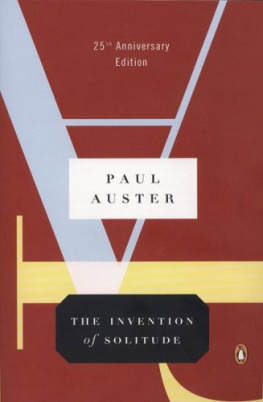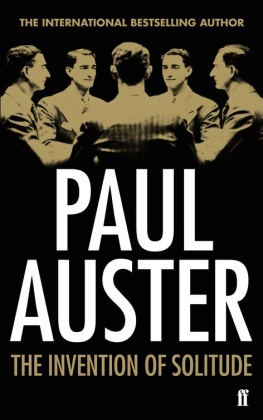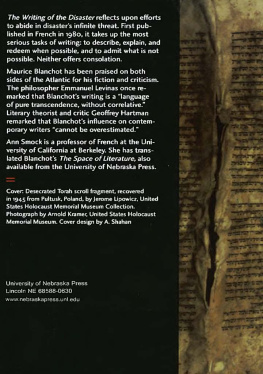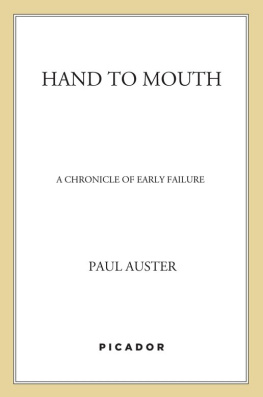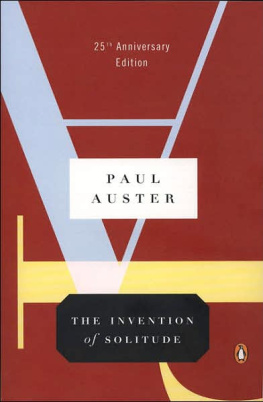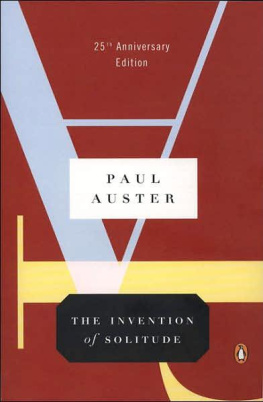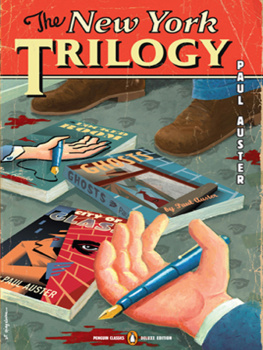
Paul Auster and the Influence of Maurice Blanchot
Mara Laura Arce

McFarland & Company, Inc., Publishers
Jefferson, North Carolina
e-ISBN: 978-1-4766-2490-7
LIBRARY OF CONGRESS CATALOGUING DATA ARE AVAILABLE
BRITISH LIBRARY CATALOGUING DATA ARE AVAILABLE
2016 Mara Laura Arce. All rights reserved
No part of this book may be reproduced or transmitted in any form or by any means, electronic or mechanical, including photocopying or recording, or by any information storage and retrieval system, without permission in writing from the publisher.
Front cover image of open book 2016 AOS82/iStock
McFarland & Company, Inc., Publishers
Box 611, Jefferson, North Carolina 28640
www.mcfarlandpub.com
To my parents,
Alicia and Hctor
Acknowledgments
I would like to acknowledge the help of a number of people and organizations in the research and writing of this book and must begin with Professor Eulalia Piero Gil for her enthusiasm, commitment and professionalism. This work could not have been possible without her help. I am also indebted to Elisabetta Marino and Rodica Mihaila for the time they dedicated to it. I would like to thank Franoise Delaunay for her excellent translations of Maurice Blanchots letters.
This research took me to many libraries, and the present work could not have been possible without the help I received along the way. I am particularly grateful to Anne Garner, librarian in charge of the Paul Auster archive in the Berg Collection at the New York Public Library in July 2009. I would also like to thank Paul Auster who came with me to the library and guided me through his documents. Grateful acknowledgement is made to Cidalia Fernandes Blanchot, Eric Hoppenot, Isaac Gerwirtz and the Henry W. and Albert A. Berg Collection of English and American Literature, the New York Public Library, Astor, Lennox and Tilden Foundations for permission to reproduce a translation of Maurice Blanchots letters to Paul Auster, June 4, 1975; December 28, 1975; August 21, 1981; and undated in the Paul Auster Papers, 19631995 (bulk 1972 through mid1995); Miscellaneous Incoming Correspondence, Box 30 Folder 2 B. This material has been fundamental for the accomplishment of this work.
I am grateful to my family, Mariana, Guille, Ta Susi, Ceci, Pancho, Carol, Caro and Emi, for their love and patience with all my stories about Paul Auster.
I am thankful to my friends Beln Espiniella, Florencia Guilln, Elena Clemente, Jorge Castro and scar Curieses for their beautiful friendship, confidence, encouragement and constant trust in everything I do.
Introduction
Paul Austers fiction is inscribed by the scholars in the American postmodern literary movement. Whereas part of contemporary American fiction is distinguished for defining a new wave of multicultural studies, Austers literature manifests its postmodernity in a different way. Thus, he belongs to a group of writers whose fiction becomes a manifestation of a late modernism that questions the role of the writer and the function of language in the literary space. According to Malcom Bradbury, postmodern writing in the late 1980s began to look with greater care at its relations to reality (American Novel 257). In this particular context, Bradbury introduces Austers fiction and asserts:
If reality was, as Nabokov had said, a word that meant nothing except in quotes, and if once realism and experiment had been flags raised by camps at war, they now increasingly engaged in peaceful intercourse and profitable trade, and therefore Jerome Klinkowitz came up with his useful formulation experimental realism. A good example of this trend is Paul Auster, a writer who, along with Walter Abish and Leonard Michaels, can be seen as a distinguished later contributor to what could now well be called the postmodern tradition [257].
In its origin, criticism in general characterizes Austers fiction as a questioning and recreation of detective fiction. Certainly, Auster opens his fiction by presenting a new genre called anti-detective fiction in which the detective case in itself loses its track and aim in order to propose some existential issues. Together with this, Auster reflects, in most of his works, on the figure of the writer and the process of creation, sometimes framed in the context of an anti-detective fiction, sometimes presented in other contexts. In this way, Austers deconstruction of detective fiction comes from the evident influence of authors like Edgar Allan Poe, the American fiction of the fifties and hard-boiled detective stories. However, the aim of this work is to focus on another specific critical link that has been barely studied by American literature academics. It is evident that there is a strong literary connection between the French writers and Paul Auster. This bond comes not only from literary curiosity but also from his stay in France and his involvement with French literature during the 1970s.
As a way of earning a living, Paul Auster developed his skills as a translator and he had the chance to study in depth some authors that were already an inspiration for his poetry and would have an effect on his future fiction. Among these writers, one name stands out: the French writer, philosopher and literary critic Maurice Blanchot. Austers work with French writers had been very well known and his The Random House Book of Twentieth-Century French Poetry (1982) was a very valuable collection of French poetry. In it, Auster makes a selection of French poets including those he translated and other influential French poets of the twentieth century. In the preface of this anthology, he writes about the importance French poetry and literature have on American literature and concludes: It is not simply that French must be considered an influence on the development of English language and literature; French is a part of English, an irreducible element of its genetic make-up (Red Notebook 41).
Apart from this, Auster, together with his first wife, the writer Lydia Davis, translated some fictional works and essays of the French writer Maurice Blanchot. Initiated by Davis, this project made it possible for Auster to approach two of Blanchots short stories, The Idyll and The Last Word, and the essay After the Fact, all published in The Station Hill Blanchot Reader (1999). However, Paul Austers first contact with Maurice Blanchot was with the translation of the essay The Book of Questions in 1971, about Edmond Jabs.
Rather than focusing the analysis on the anti-detective genre and the existential aspects it presents, I introduce the possible relationship the translation of Maurice Blanchots texts and particularly his ars poetica could have to the construction of Paul Austers fiction. The translated texts became for Auster his contact with Blanchots critical theory and fiction. In the process of his translation, Auster exchanged some letters with Blanchot to certify and improve his translation. Auster made it possible for me to have access to his archive in the New York Public Library and there I found all the letters he exchanged with Blanchot. These letters show evidence that Auster was interested in Blanchot reading his work and, in fact, Blanchot makes some comments on Austers poetry. This work takes this event as the starting point of a literary connection that is reflected in most of Austers work. Although there is no evidence that Auster has been at some point familiarized with the whole of Blanchotian corpus, it is possible to track some basic concepts and theories proposed by the French philosopher in Austers fiction. In other words, Blanchots texts inspired Auster to fictionalize his theory of literature in his works.
Next page
